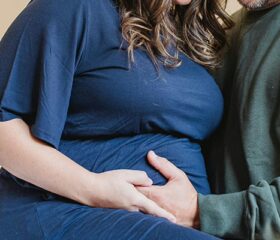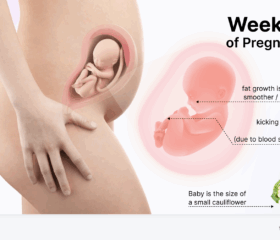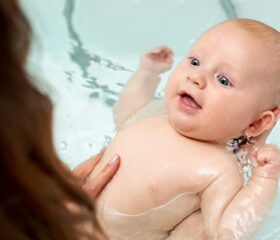Newborn Hiccups: Why They Happen and How to Stop Them
You probably don’t think twice when you’ve got a case of the hiccups, but watching your tiny newborn do it is another story.

While some parents find their baby hiccuping adorable, others find it concerning or even downright scary. Is it normal for a baby to hiccup this early in life? How long will the hiccups last? Can you help your baby get over them faster?
Read on for answers to all your questions about newborn hiccups. You’ll also learn when you should be concerned about hiccups in your baby and when to call your doctor.
Is it normal for newborns to get hiccups?
Yes, it’s perfectly normal for newborns to get hiccups. In fact, your baby may start hiccuping before she’s even born, as early as 20 weeks into your pregnancy. 1
You generally don’t have to worry if you catch your newborn hiccuping (which may be quite regular). She’ll probably stop in a few minutes. 2
Why do newborns get hiccups?
Newborns (and adults) get hiccups because of spasms in the diaphragm, a large muscle at the base of the chest that’s important for breathing. These spasms cause the vocal cords to close quickly and make the characteristic “hic” sound. 2
It’s hard to say exactly what the root cause of hiccups is, but a few factors contribute to them: 3
- Feeding too quickly: Eating too fast may make your baby gassy due to her swallowing air, which can also irritate the diaphragm and cause hiccups and bloating. This may also cause her to spit up after eating, with many babies spitting up until they’re around 6–7 months old.
- Overfeeding: If your baby’s stomach is too full, it can also put pressure on the diaphragm.
- Stress or stimulation: Newborns may hiccup when they’re stressed or stimulated. This is especially common during the first few months when they don’t have full control over certain bodily functions yet. 4
- Temperature changes: If the temperature suddenly changes, whether it’s outside or inside your baby’s body (e.g., if you feed her something cold immediately after something warm), she might get the hiccups. 5
- Gastroesophageal reflux disease (GERD): Frequent hiccups can also be a sign of GERD, which can make your baby spit up. If she has GERD, it’ll usually go away around her first birthday when her digestive muscles fully develop. 6
To expand on the last entry, it’s important to note that having hiccups doesn’t mean your baby has GERD. Check if she has other symptoms, such as:
- Coughing
- Gagging and vomiting
- Arching her back
- Bad appetite
- Irritability after feeding
- Poor weight gain
- Trouble breathing
- Colic (crying excessively for 3+ hours a day) 7
If she has any of those symptoms, get her to the doctor (even though, as mentioned, they may resolve themselves in time).
How to stop newborn hiccups
Again, newborn hiccups are very common and normal. They’ll typically go away on their own before you know it. However, you might be able to help your baby ease her hiccups by breastfeeding her or giving her a pacifier. 8
Burping your baby during and after feedings can also help. Doing so releases trapped air in her stomach and reduces the pressure on her diaphragm. To burp your baby, let her sit on your lap, hold her head in your hand, and lean her forward slightly. Then, gently pat or rub her back. 910
If your baby starts hiccuping during feeding, take a small break to let her hiccups die down before resuming.
Can you give your baby water to get rid of hiccups?
You may have heard that drinking cold water can cure hiccups. This method isn’t for newborns. Your baby can’t drink water until she’s 6 months old. She should get all the fluids she needs from breast milk or formula before then.
Drinking water can actually be dangerous at this stage. Wait until she starts eating solids before introducing her to it. 1112
Also, don’t startle or scare your baby or use folk remedies to cure her hiccups, such as pressing on her fontanel, pulling her tongue, or giving her herbal concoctions like gripe water (especially without checking with your doctor first).
These aren’t effective or safe ways to stop hiccups; to the contrary, they’re dangerous and can lead to serious harm.
How to prevent newborn hiccups from starting
It’s impossible to keep hiccups at bay completely. However, try out these strategies to help your newborn hiccup less often:
- Feed your baby when she’s calm: Feed your baby before she becomes overly hungry and starts crying. She may swallow more air while feeding if she’s upset (or just ravenous).
- Use a correctly sized nipple: A bottle nipple with a hole that’s too large can cause the milk to flow too quickly, while one that’s too small may cause the baby to gulp air, both of which can cause hiccups.
- Ensure a good breastfeeding latch: If you’re breastfeeding, make sure your baby latches on properly so she won’t swallow too much air. You might want to work with a lactation consultant if you’re having trouble with this.
- Avoid overfeeding: Pay attention to your baby’s cues to avoid overfeeding, which can lead to more hiccups. You can also use a baby tracker app to get a better idea of her feeding habits, reactions, and preferences.
- Tilt the bottle during feedings: If you’re bottle feeding, tilt the bottle to fill the nipple with breast milk or formula so that your baby won’t swallow too much air. 13
Again, it’s also a good idea to burp your baby 5–10 minutes after feeding her. This will help settle her stomach and release swallowed air.
When should you consult a doctor?
In most cases, newborn hiccups don’t need medical attention. However, there are a few rare instances when you should be concerned. Call your doctor if:
- She seems to be in pain or discomfort while hiccupping.
- Her hiccups last for an extended period (more than 2 days) or occur very often.
- Your baby has other symptoms, such as spitting up more than usual, coughing, or having trouble feeding.
Don’t self-diagnose your baby (something that’s never a good move). If you suspect something is wrong with her, just call your doctor and get a professional’s take.
Final thoughts
No matter who you are, you can’t escape getting a few hiccups here and there—starting when you’re just a tiny fetus in the womb.
Thankfully, hiccups are usually harmless, even in newborns. With that in mind, you can feel at ease watching your baby experience her first hiccups. It’s a small but adorable milestone!
Article Sources
- South Dakota Department of Health. "Fetal Growth and Development" Retrieved June 10, 2025.
- MedlinePlus. "Hiccups" Retrieved June 10, 2025.
- MedlinePlus. "Hiccups" Retrieved June 10, 2025.
- MedlinePlus. "Infant - newborn development" Retrieved June 10, 2025.
- Harvard Health Publishing®. "What’s up with hiccups?" Retrieved June 10, 2025.
- MedlinePlus. "Gastroesophageal reflux disease - children" Retrieved June 10, 2025.
- MedlinePlus. "Reflux in Infants" Retrieved June 10, 2025.
- American Academy of Pediatrics. "Baby Burping, Hiccups & Spit-Up" Retrieved June 10, 2025.
- MedlinePlus. "Baby burping position" Retrieved June 10, 2025.
- The South Dakota WIC (Women, Infants, and Children). "Bottle Feeding Basics" Retrieved June 10, 2025.
- North Carolina Department of Health and Human Services. "Tips for Providers: Drinking Water" Retrieved June 10, 2025.
- The Children's Hospital of Philadelphia. "Infant Feeding Guide" Retrieved June 10, 2025.
- Michigan WIC (Women, Infants, and Children). "Nutrition Education Staff Training Infant Nutrition Module" Retrieved June 10, 2025.






